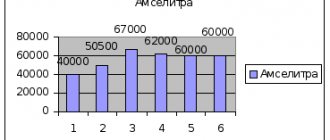The job description of an economist establishes a complete list of work responsibilities for this category of employees of enterprises and organizations. It determines the procedure for appointing and dismissing an economist, the rules and laws with which he must be familiar, and also gives an idea of his rights and the extent of responsibility for specific offenses that may serve as grounds for disciplinary punishment.
Despite the fact that the document does not apply to mandatory company documentation, it is distributed almost everywhere. This is due to the fact that a job description is important not only for the employee, to whom it gives a clear idea of working conditions, but also for the employer, for whom it allows him to regulate production processes and coordinate interaction within the team.
FILES
Basic rules for writing a job description
The job description of an economist does not have a unified form, so you can compose it freely, based on the needs of the company, or use widely used templates. Regardless of which option is chosen by the developer of the instructions, it should include several main sections relating to general provisions, directly performed functions, rights and responsibilities of the employee. If necessary, it can be supplemented with other paragraphs (for example, “Signature right”, “Special conditions”, etc.).
A job description is drawn up in one copy for a specific employee.
If the organization employs several employees of a certain specialty, then the document needs to be adjusted (to avoid repetition of the functions assigned to them).
The job description must be certified by the head of the enterprise, as well as by the employee for whom it was developed. The employee’s personal signature will indicate that he agrees with the responsibilities and rights that are specified in the instructions, and also understands and accepts responsibility for possible violations and misconduct.
Responsibilities and main functions
The list of the main functions that a labor economist must perform, the responsibilities and tasks facing a specialist in this area may consist of the following items:
- Engaged in the development of main directions and methods for increasing labor productivity and work efficiency.
- Improves working conditions and opportunities.
- Introduces new methods of stimulating productivity and material incentives for employees, developing systems of bonuses and allowances to the basic salary.
Development of improvements - Monitors the efficiency of the production and technological process.
- Analyzes the distribution of labor resources and wage fund, offering the most effective option for using available labor and material capabilities.
- Monitors the compliance of employees with their positions, and is involved in sending them to educational and practical activities in order to further improve their qualifications.
- Offers the optimal option for the distribution of additional material assets and reserves of the enterprise formed as a result of the growth of net profit.
- Develops action plans for labor protection, efficient use of labor resources, machines and equipment.
- Actively participates in social policy, including the development of relevant clauses of the employment contract.
- Develops a staffing table and promptly makes appropriate changes to it as a result of the introduction of new positions and redistribution of workload.
- Manages all information regarding the number of employees, the list of their job responsibilities, level of qualifications and wages, makes appropriate changes in a timely manner and provides data to other services.
Drawing up a job description for an economist
At the top, in the middle of the document, its name is written, and then in the upper right part there is space for the executive resolution. Here you need to fill in a few lines:
- management position (CEO, executive director, director),
- full name of the company,
- last name, first name, patronymic of the “chief”.
General provisions
In the first section, entitled “ General Provisions ,” it is first written down which category of workers the economist belongs to (specialist, manager, worker, employee, etc.) and to whom he directly reports. Next, the procedure for replacing an employee during his absence is indicated (without entering specific names in the document), requirements for the level of education and work experience, as well as the rules for his appointment and dismissal.
Just below in the same section all methodological materials, orders, instructions, acts and other documents that an economist should be guided by when performing his work duties are prescribed. In exactly the same way, a separate paragraph lists the laws, rules, internal regulations and documents with which he is required to be familiar as part of his duty.
Job responsibilities of an economist
The second section, “ Job Responsibilities of an Economist ,” deals directly with the functions that an economist must perform. Depending on the company, the items may differ slightly from each other, but the main responsibilities are still quite standard. Here it is necessary to list in detail all the tasks that the employee will have to solve, but it is important to take into account his working time so that there is no excessive or insufficient workload on him. You also need to ensure that the responsibilities of one employee are not duplicated in the job description of another.
Economist's rights
The “ Rights ” section is a paragraph about exactly what powers are given to an economist for more efficient and fruitful work. In particular, it specifies the right to make constructive proposals aimed at improving the performance indicators of him personally and the team as a whole, stipulates the possibility of interaction with the management of the enterprise and other departments, and also provides the right not to start work if any threats or health hazards arise and life.
Responsibility of an Economist
Responsibility section lists in detail a list of actions, violations and misconduct that entail punishment in the form of disciplinary action (reprimands, deprivation of bonuses, reprimand, dismissal, etc.).
After thoughtful and careful development of the economist’s job description, it must be submitted for approval and signature to the employee who is responsible for ensuring that the points specified in it are observed (the head of the economic department, the head of the personnel department, etc.). Here you need to enter his position, the name of the organization, last name, first name, patronymic, and also certify all this with a personal autograph.
Next, official and personal data about the economist are entered in the same way: his last name, first name, patronymic, position, again the name of the company, passport data (or information from another identification document), signature and date of reading the instructions.
For those who want to become a labor economist: answers to 5 important questions
A labor economist is a specialist, without whom it is almost impossible to build an effective enterprise economy. A lot depends on the quality of his work, from the company’s net profit to staff turnover.
We will tell you what a labor economist does, what he is responsible for, and how to master this profession in a few months. And as a bonus, we will provide useful information for those who want to become a sought-after specialist, solve interesting problems and receive an above-average salary.
What does a labor economist do?
A complete list of responsibilities is contained in the specialist’s job description. Each company has its own, but a standard version is suitable for reference. Typically, the job responsibilities of a labor economist include:
- development of regulatory documents on the remuneration system, including provisions on bonuses and de-bonuses;
- preparation of staffing schedules and job descriptions;
- calculation of production standards;
- accounting for labor costs and overtime;
- monitoring the efficiency of the production process (whether the work flow can be improved, whether equipment needs to be modernized or replaced, whether more employees should be hired);
- searching for methods to increase productivity and reduce costs wisely;
- checking the compliance of employees’ qualifications with the positions they occupy;
- development of proposals for the distribution of additional funds when increasing net profit;
- development of schemes for material motivation of employees.
Mistakes by a labor economist can lead to major problems for the company. If wages are underestimated, there is a risk of sabotage, constant turnover, and decreased quality of products or services. If it is too high, the cost of goods and services increases, the company's net profit decreases, and in the worst case, products become too expensive for customers, and the organization begins to lose to competitors. Incorrect calculation of production standards will lead either to the reluctance of people to work in conditions that are too heavy and to breakdowns of equipment, or to a decrease in efficiency. And this is only part of the possible negative consequences.
On the contrary, thanks to a professional economist, the company will grow and working conditions will improve.
What should a labor economist know?
- Requirements of the legislation of the Russian Federation for organization, payment and labor protection.
- Rules for drawing up regulatory documents that regulate labor relations, rationing and remuneration.
- Calculation methods and methods of calculating salaries, allowances, bonuses, coefficients.
- Rules for filling out planned and periodic reporting forms.
- Features of working with different programs. In particular, what an economist should know about Excel: how to work with pivot tables and generate reports on expenses and salaries, how to prepare a report on financial results and prepare management balance sheets.
Might also be interesting
Help: features of preparation, design, standard templates
Changes in labor legislation in 2020
We have prepared for you an overview of changes in labor legislation [...]
What is a labor economist responsible for?
For improper or untimely performance of duties according to the job description, for refusal to fulfill one’s direct duties and/or orders from superiors, for disclosure of trade secrets, violation of safety regulations and internal regulations.
An important point: if the organization suffers losses due to the fault of the economist, he will have to compensate for the damage. We have already written in detail about the procedure for collecting material damage from employees.
Which labor economist course should I take to master this profession?
We recommend the course “Economics and labor regulation. Administration of labor organization and personnel remuneration processes.” The program takes into account the requirements of the professional standard and the latest amendments to the Labor Code of the Russian Federation.
The course includes 29 practical tasks, for each of which you will receive feedback. You will learn the step-by-step actions of a labor economist when calculating training costs, determining production standards, analyzing the labor market, etc. Correct your mistakes, listen carefully to the recommendations of expert practitioners, and then after completing the course you will be completely ready for real work in a company.
Please note: the professional standard for a labor economist establishes level 6 qualifications. This means that training is only suitable for people with higher education (including bachelor's degrees).
How to become a successful, sought-after specialist?
So far, the demand for economists in the labor market is not too high. But, firstly, this specialty has great potential, and secondly, there are not many real professionals in this field, and almost all of them already occupy good positions. Many companies lack competent specialists. Become one of them, and it will be much easier for you to find a good job.
Listen to our advice if the standard salary of a labor economist (40-50 thousand rubles in Moscow and 20-30 thousand rubles in the regions) does not suit you, and you would like to earn more.
- Give up the “once learned, always used” principle. Working according to the same schemes will not help you become a real pro. Follow changes in the economic situation in Russia, study the experience of other companies and countries, take a closer look at trends and think about how to use them for the benefit of the organization in which you work. Create and improve your own systems. Remember: sometimes it is what you accept as an axiom and do not question that prevents you from working more effectively.
- Develop the ability to objectively assess the situation without panicking when problems arise, the ability to patiently communicate with people, the willingness to look for new methods in solving problems, attentiveness in working with documentation and the habit of double-checking your own work.
- Do not hold on to a job in a company if the position has become “small” for you (no options for career growth, no training, no interesting tasks, etc.). Stability is addictive and calming, but it takes away opportunities for development.
- Learn from the best. To do this, you don’t have to go to training or look for a mentor. Find those in your work environment who are best at specific tasks (good time management, good negotiators, etc.), observe them and learn from them.
- Looking for a job? View labor economist resume samples and find the best solutions. The results of your work are easy to evaluate - use it. Look at examples of resumes with numbers: how much staff turnover has decreased, the company's net profit has increased, expenses have been reduced, etc. Collect such data while you work in the company, so that when the time comes to climb the career ladder, you can prepare an impressive resume and interest employers from large companies. organizations.
Don't let the routine bog you down, improve like a professional, and you will have a much greater chance of success!
Might also be interesting
Career in HR and office management: paths from start to top
You can work as a personnel officer even if you received a different education. According to the study, only 9% of workers in this field have a specialized image […]
What are the responsibilities of an economist?
The main job responsibilities of an economist involve developing and coordinating all people who are responsible for carrying out planned tasks based on statistical reporting. A person with a higher education, as well as a master's degree or a specialist in Economics, is appointed to this position.
In his activities, a specialist of this profile is guided by what the job responsibilities of an economist dictate to him. Moreover, both the appointment of such a person and his dismissal from work are carried out only on the basis of an order from the immediate head of the company.
Saving
The job responsibilities of a leading economist include a thorough analysis of the company's economic activities, as well as individual structural divisions. In addition, a specialist in this field develops actions aimed at ensuring savings, increasing production profitability, labor productivity, reducing costs of production and sales of products. Opportunities are also identified that allow the production of additional products.
The job responsibilities of an economist in a healthcare institution or other production areas should determine the economic efficiency of the organization of labor and the production process, including the introduction of new technologies and techniques, as well as all kinds of rationalization inventions and proposals. Thus, the specialist is directly involved in the procedure for developing various production and economic plans, based on statistical data from the work carried out in the field of resource conservation.
Job description of an economist
I confirm ………………………………………… ……………………………………………. (name of company) ……………………………………………. (position) …………….………………………………… (full name) “…..” …………………. 20….. g. m.p.
……………………………………………………………………………………………….. (name, enterprise, organization)
General provisions
1.1. An economist belongs to the category of specialists.
1.2. An economist is appointed to a position and dismissed from it by order of the director upon presentation
……………………………………………………………….…………………………………………………….. (head of financial department, structural unit / other official)
1.3. The economist reports directly to:
……………………………………………………………….…………………………………………………….. (to the head of the financial department, structural unit / other official)
1.4. The following are appointed to the position of economist: - economist of category I : a person with a higher professional (economic) education and work experience as an economist of category II for at least 3 years; — economist of category II : a person with a higher professional (economic) education and work experience as an economist or other engineering and technical positions filled by specialists with higher professional education for at least 3 years; — economist : a person who has a higher professional (economic) education without presenting requirements for work experience or secondary vocational (economic) education and work experience as a category I technician for at least 3 years or other positions filled by specialists with secondary vocational education, at least 5 years.
1.5. In his activities, the Economist is guided by: - legislative acts of the Russian Federation; — orders and instructions from management; — governing regulations and instructions of the enterprise; — the charter of the organization; — labor regulations; - this job description.
1.6. During the absence of the economist, his duties are performed by a person appointed in accordance with the established procedure. This person acquires the corresponding rights and is responsible for the proper performance of the duties assigned to him.
1.7. An economist must know: - regulations, legislative and regulatory legal acts, orders, instructions on planning, accounting and analysis of the work of enterprise divisions; — rules for drawing up and maintaining planning and accounting documentation; — rules and procedures for developing business plans; — rules for developing annual plans for the economic, production, and financial activities of the organization; — rules for developing standards for the costs of labor, material, and financial resources; — methods of economic analysis and accounting of performance indicators of an enterprise and its divisions; — methods for determining the economic efficiency of introducing new equipment and technology, labor organization, rationalization proposals and inventions; — rules for preparing materials for concluding contracts; — organization, procedure, rules and timing of statistical and operational accounting, preparation of established reports; — economics, organization of production, labor and management; — market methods of management; — the possibility of using computer technology to carry out technical and economic calculations, analyze and record performance indicators of enterprise departments; — methods of carrying out computational work; — labor legislation; — rules and regulations of labor protection.
Job responsibilities
Economist: - performs work to implement the current economic activities of the enterprise, increase the efficiency and profitability of production, the quality of products and the development of new types of products; — prepares initial data for drawing up projects for the economic, financial, production and commercial activities of the enterprise in order to ensure growth in product sales volumes and increase profitability; — performs calculations on material, labor and financial costs necessary for the production and sale of products, the development of new types of products, the introduction of advanced technologies; — carries out an economic analysis of the economic activity of the enterprise and determines the economic efficiency of the organization of labor and production; — identifies production reserves and develops measures to introduce a saving regime, increase production profitability, increase the competitiveness of products and labor productivity, reduce losses and overhead costs for production and sales of products, and also identifies opportunities to increase the volume of products; — determines the economic effectiveness of the introduction of new technology, rationalization proposals, inventions; — takes part in the consideration of plans for production and economic work and resource conservation, in market research, forecasting and production development; — prepares data for concluding contracts; — monitors the implementation of planned tasks for the enterprise and its divisions; — keeps records of economic indicators of the results of production activities of the enterprise and its divisions; — prepares established reports within certain deadlines; — performs work on the formation and maintenance of a database of economic information; — controls the implementation of tasks assigned to the divisions of the enterprise under concluded contracts; - carries out individual official assignments from the immediate superior.
Rights
The economist has the right: - to get acquainted with draft decisions of the enterprise management relating to its production activities; — submit proposals for the management’s consideration to improve work related to the responsibilities provided for in these instructions; — inform the immediate supervisor about all shortcomings in production activities identified during the performance of their official duties and make proposals for their elimination; — request and receive from the structural divisions of the enterprise the necessary materials and documents related to the activities of the economist; — represent the interests of the enterprise and enter into relationships with divisions of third-party organizations on issues related to the performance of his official duties; — make decisions independently within your competence; - demand from the management of the enterprise to ensure organizational and technical conditions for the performance of his official rights and duties; - demand provision of normal working conditions.
Responsibility
The economist is responsible: - for the consequences of decisions made by him that go beyond the limits of his powers established by the current legislation of the Russian Federation, the charter of the enterprise, and other regulatory legal acts; - for failure to fulfill (improper performance) of their official duties provided for by these instructions, within the limits determined by the current labor legislation of the Russian Federation; - for committing an offense in the course of carrying out their activities - within the limits determined by the current administrative, criminal and civil legislation of the Russian Federation; - for causing material damage and damage to the business reputation of the enterprise - within the limits determined by the current labor, criminal and civil legislation of the Russian Federation.
Working conditions
5.1. The work schedule of the Economist is determined in accordance with the Internal Labor Regulations established at the enterprise.
5.2. Due to production needs, the Economist may go on business trips.
Signature right
To ensure his activities, the economist is given the right to sign organizational and administrative documents on issues included in his functional responsibilities.
Other
This job description has been developed and approved in accordance with the provisions of the Labor Code of the Russian Federation and other regulations governing labor relations in the Russian Federation.
Agreed:
Head of the legal department
……………….…………… / ……….… "……" ………………………20 …. g. (full name / signature)
I have read the job description
……………….…………… / ……….… "……" ………………………20 …. g. (full name / signature)
Responsibility
When thinking about profits and responsibilities, many people forget about the responsibility that an ordinary or chief economist should bear. Job duties must be performed in full accordance with the instructions provided, because in case of failure to fulfill them, the specialist bears direct responsibility for this.
He is also responsible for various offenses that are committed during work and are within the boundaries determined by the current administrative or criminal legislation.
Among other things, the economist, as a rule, bears direct responsibility for what material losses were caused to the company during the course of his work in the position provided.
Economist
Job Description for Economistzip
You can download the economist job description for free . Job responsibilities of an economist
I approve
_____________________________ (Last name, initials)
(name of organization, its ________________________________
organizational and legal form) (director; other person authorized
approve job description)
00.00.201_g.
m.p.
JOB DESCRIPTION
ECONOMIST
——————————————————————-
(name of institution)
00.00.201_g. №00
I. General provisions
1.1. This job description establishes the rights, responsibilities and job responsibilities of an economist_______________________________________ (hereinafter referred to as the “enterprise”).
Name of institution
1.2. An economist belongs to the category of specialists.
1.3. Person appointed to the position:
- an economist of category I, a person must have a higher professional (economic) education and work experience as an economist of category II for at least ______ years;
- an economist of category II must have a higher professional (economic) education and work experience as an economist or other engineering and technical positions filled by specialists with higher professional education for at least _______ years;
— an economist must have a higher professional (economic) education, without any requirements for work experience, or a secondary vocational (economic) education and work experience as a category I technician for at least _______ years or other positions filled by specialists with a secondary vocational education, at least _______ years.
1.4. Appointment to the position of economist and dismissal from it is carried out on the basis of an order from the director of the enterprise upon the recommendation of ____________________________.
(head of the relevant structural unit)
1.5. The economist reports directly to ________________________________________________.
(to the head of the relevant structural unit)
1.6. If the economist is absent, then his duties are temporarily performed by a person appointed in accordance with the established procedure, who is responsible for the proper performance of his official duties.
1.7. In his activities, the economist is guided by:
— labor regulations;
- regulatory and methodological materials on the issues of the work being performed, orders and instructions from the director of the enterprise and the immediate supervisor;
— the charter of the enterprise;
- this job description.
1.8. An economist should know:
— the procedure for developing long-term and annual plans for the economic, financial and production activities of the enterprise;
— the procedure for developing business plans;
— planning and accounting documentation;
— legislative and regulatory legal acts, methodological materials on planning, accounting and analysis of enterprise activities;
— organization of planned work;
— the procedure for developing standards for material, labor and financial costs;
— methods of economic analysis and accounting of performance indicators of an enterprise and its divisions;
— methods for determining the economic efficiency of introducing new equipment and technology, labor organization, rationalization proposals and inventions;
— methods and means of performing computational work;
— rules for preparing materials for concluding contracts;
— organization of operational and statistical accounting;
— procedure and deadlines for reporting;
— basics of production technology;
— market methods of management;
— the possibility of using computer technology to carry out technical and economic calculations and analyze the economic activities of an enterprise, the rules of its operation;
— labor legislation, rules and regulations of labor protection.
— domestic and foreign experience in the rational organization of economic activity of an enterprise in a market economy;
— economics, organization of production, labor and management.
II. Functions
The economist is assigned the following functions:
2.1. Participation in marketing research.
2.2. Carrying out work related to the economic activities of the enterprise.
2.3. Analysis of the production activities of the enterprise and preparation of reports.
III. Job responsibilities
The economist performs the following duties:
3.1. Performs calculations on costs - material, labor and financial, which are necessary for the production and sale of manufactured products, the development of new types of products, advanced equipment and technology.
3.2. Performs work related to the implementation of economic activities of the enterprise, aimed at increasing the efficiency and profitability of production, the quality of products, develops new types of products, achieves high final results with the optimal use of material, labor and financial resources.
3.3. Participating:
— in considering developed production and economic plans, carrying out work on resource conservation, in introducing and improving internal economic calculations, improving progressive forms of labor organization and management, as well as planning and accounting documentation;
— in conducting marketing research and forecasting production development;
— in the formation of the economic formulation of problems or their individual stages, which are solved with the help of computer technology.
3.4. Determines the possibility of using ready-made projects, algorithms, application software packages that allow creating economically sound systems for processing economic information.
3.5. Prepares initial data for drawing up projects for economic, financial, production and commercial activities (business plans) of the enterprise in order to ensure growth in product sales and increase profits.
3.6. Analyzes the economic activities of the enterprise and its divisions from an economic point of view.
3.7. Identifies production reserves, develops measures to ensure savings, increase production profitability, competitiveness of products, labor productivity, reduce production and sales costs, eliminate losses and unproductive expenses, and also develop measures to identify opportunities for additional production.
3.8. Prepares periodic reports within specified deadlines.
3.9. Determines the economic efficiency of the organization of labor and production, the introduction of new equipment and technology, rationalization proposals and inventions.
3.10. Responsible for preparing materials for concluding business contracts and monitoring the deadlines for fulfilling contractual obligations.
3.11. Controls the process of fulfilling planned targets for the enterprise and its divisions, as well as the process of using on-farm reserves.
3.12. Performs work related to non-routine settlements and monitoring the correct implementation of settlement transactions.
3.13. Keeps records of economic indicators of the performance of the enterprise and its divisions in the field of production, as well as records of concluded contracts.
3.14. Performs individual job assignments given by the immediate supervisor.
3.15. Performs work on the formation, maintenance and storage of a database of economic information.
3.16. Develops and makes changes to reference and regulatory information that is used in data processing.
IV. Rights
An economist has the right:
3.1. Contact the company management:
— with the requirement to provide assistance in the performance of their official duties and rights;
— with proposals for improving work related to the responsibilities provided for in this instruction.
3.2. Receive information and documents from heads of structural divisions and specialists on issues within his competence.
3.3. Involve specialists from all (individual) structural units in solving the tasks assigned to them (if this is provided for by the regulations on structural units, if not, with the permission of the manager).
3.4. Get acquainted with the draft decisions of the enterprise management concerning its activities.
V. Responsibility
The economist is responsible for:
5.1. In case of causing material damage, within the limits determined by the criminal, civil, and labor legislation of the Russian Federation.
5.2. If an offense is committed in the course of carrying out its activities, within the limits determined by the criminal, civil, administrative legislation of the Russian Federation.
5.3. In case of failure to perform or improper performance of their official duties, which are provided for in this job description, within the limits determined by the labor legislation of the Russian Federation.
Head of structural unit: _____________ __________________
(signature) (surname, initials)
00.00.201_g.
I have read the instructions,
one copy received: _____________ __________________
(signature) (surname, initials)
00.00.20__
Rights
An economist has the right to familiarize himself with any decisions that are relevant to his activities, while he can independently make any proposals aimed at increasing labor within the boundaries of his official duties.
The economist has the right to warn management that he has discovered any deficiencies in accounting. He can also independently or at the request of management ask other employees for various data related to his immediate job description. In addition, the specialist has the right to independently bring to the attention of management various proposals that are aimed at improving the performance of his official duties.










